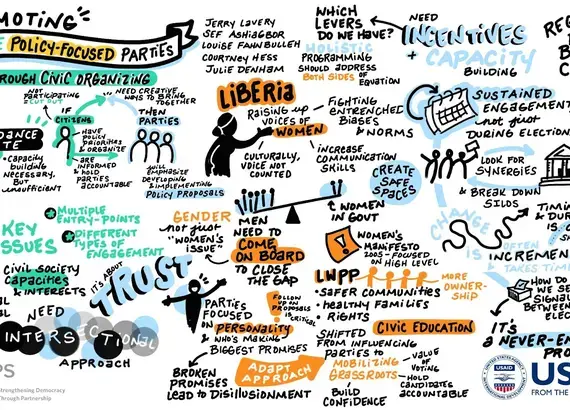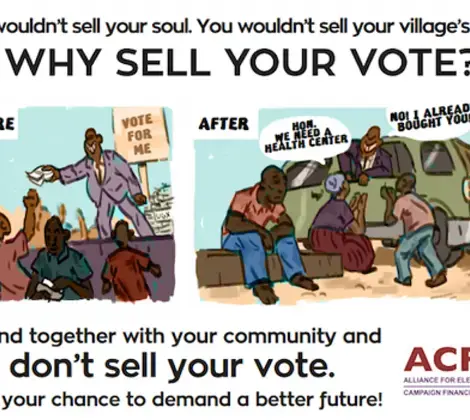
Success Story
Building Back Democratically with Parties
Despite authoritarians’ rhetoric to the contrary, scientific evidence confirms that democracies produce higher rates of economic growth, experience fewer and less severe financial crises and provide better safety nets for the poor and vulnerable. They also achieve higher levels of gender equality and facilitate cooperation for the common good. The same research notes that “mediocre levels of democracy are not enough” for these impressive dividends to accrue.
As a result of the Covid-19 pandemic, millions of people have been pushed back into poverty, resulting in the first increase in extreme poverty rates in 20 years. In addition, the pandemic has exposed and heightened many of the challenges that democracies around the world face in living up to their full potential. While each country faces its own unique set of issues, common challenges include corruption, executive overreach, disinformation, polarization and marginalization of women, young people and other underrepresented communities. In several countries around the world, political elites do not care about them. Understandably, then, citizens also exhibit abysmally low levels of trust in political parties. Widening socio-economic disparities, unless they are reversed, are likely to erode public trust in parties and other institutions further.
Pandemic recovery efforts are more likely to be successful if the flaws in democracies around the world can be addressed. Building back democratically from the pandemic requires enhanced efforts to: combat corruption; strengthen information integrity; make policymaking more participatory and inclusive; renew the social contract; and enhance legislative deliberation and oversight. None of these goals can be achieved without political parties that provide people -- regardless of gender, age, religion, race or other markers -- with meaningful opportunities to participate in politics and influence the direction of government.
Responsive policy-making requires informed and active citizens that express their policy preferences and hold their leaders accountable for those priorities. While civic organizing is valuable in its own right as a means to increase citizen participation in political processes, it can also serve an instrumental purpose in promoting more policy-focused parties. For instance, through issue-based voter education, debates, citizen platforms and political process monitoring efforts, civic groups have tried to push political parties to: increase their focus on policies, involve citizens in policy processes, and improve service delivery. A review of selected programs, funded by the Global Elections and Political Transitions Leader with Associates grant, highlighted the following lessons learned about this approach.

However, a heavy focus on election-related programming without complementary follow-on activities throughout the political cycle may limit program effectiveness, and even inadvertently undermine the credibility of civil society. In Liberia and Uganda, civic activists and political leaders noted that political elites are highly skeptical of civic groups who significantly increase their activities around elections. Political leaders are more likely to assume that these groups have thinly-veiled political motives and hope to influence election outcomes. Particularly in closed or closing spaces, a heavy focus on election-related activities may expose civic activists to greater risk of backlash.
In Liberia, an additional concern emerged. Legislators conduct limited outreach outside election periods, in part, because they worry about the grand promises they made and the personal demands from citizens. One reason why citizens place such demands on their political leaders is because they see them so rarely outside election periods. As voters become resentful over the limited contact with their elected representatives, they perceive campaigns as a harvest season of sorts, fueling the cycle of clientelism. As a result, a focus on election programming without sufficient follow-up in the post-election period can inadvertently deepen citizen disenchantment with political processes and democracy. Programs are more likely to be successful if they use multiple entry points across the political cycle -- not just around elections.
Further, while partnerships can help groups of citizens build power, not all alliances are appropriate. In Slovakia, Roma who expanded their political power through partnerships with allies in the mainstream were more effective at getting their voices heard. At the same time, Roma are a diverse community or rather a diverse series of communities. Further, different members of the community make different decisions about whether or not to identify as Roma. Given these differences, attempts to artificially unite Roma behind a common policy platform would not have been appropriate.
Finally, programming that helps citizens organize around the issues they care about; encourage political elites to address those issues; and hold political leaders accountable throughout the political cycle should be combined with technical assistance to parties themselves, especially those parties willing to move closer to citizens. These efforts can contribute to more informed, more participatory and more inclusive policymaking, ultimately contributing to better parties, stronger democracies and better socio-economic dividends for all.
This programming is made possible by support from the United States Agency for International Development (USAID) through the Consortium for Elections and Political Processes (CEPPS).
NDI is a non-profit, non-partisan, non-governmental organization that works in partnership around the world to strengthen and safeguard democratic institutions, processes, norms and values to secure a better quality of life for all. NDI envisions a world where democracy and freedom prevail, with dignity for all.
